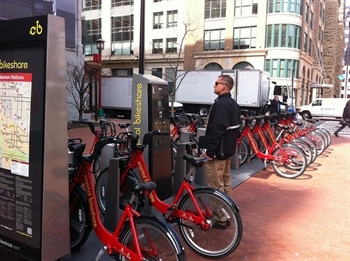
Riding bike sharing in Mexico City.
Did you know? In Paris and Barcelona almost 40 percent of bike share trips are in conjunction with transit.
Chicagoans, get geared up: This summer, Chicago’s first large-scale bike sharing network will roll out across the city, with 3,000 bicycles available to rent from 300 stations in 2012, and 4,000 bikes at 400 stations by next year. (Kudos to City Council for approving the plan on April 18.)
Bike sharing has become incredibly popular across the globe: More than 240 cities have bike share systems that allow members to rent a bike at one location, ride to their destination, and drop off the bike at the nearest station. Chicago bike share members will pay an annual fee of $75 for unlimited rides under 30 minutes, the expected time for most trips. To encourage quick turnover, after the initial 30 minutes the cost will be $1.50 to $2.00 an hour. For tourists and infrequent users, shorter subscription periods also will be available. Like the Chicago Transit Authority’s (CTA) Chicago Card Plus, members will sign up via a web site, while one-time users will be able to register with a credit card at station kiosks.
The bikes, designed for riders of all skill levels, will sit at solar-powered docking stations near CTA and Metra locations and in other high-density areas across the city. In 2012, bikes will be available as far north as Montrose Avenue, as far south as 43rd Street and the lakefront, and as far west as Western Avenue. In 2013, the system will reach north to Devon Avenue, south to 63rd Street, and west to California Avenue. Stations will be located approximately every quarter-mile. Because the stations were designed to be mobile, they can easily be deployed in new locations around the city to meet demand. The Chicago Dept. of Transportation (CDOT) will work with the public to determine station locations at community meetings and via online and social media. Portland, Ore.,-based Alta Bicycle Share will run the program (the City will retain ownership.) The contract requires Alta ensure that no station is either full or empty for more than three hours, snow is removed within 24 hours, and graffiti within 48 hours.
Chicago was the recipient of the coveted and highly competitive U.S. Dept. of Transportation TIGER grant, which will cover almost all of the $19.5 million capital cost. The City will fund the remaining $1.5 million. It is expected that revenues from membership fees will fund operations and maintenance. The City will retain all profits from station-based advertising. According to CDOT, bike share will ultimately be a revenue generator.
Bicycle sharing is a great way to increase overall transit usage by providing first and last mile connectivity. In Paris and Barcelona, home to two of the world’s largest bike share systems, 40 percent of bike share trips are in conjunction with transit. As CDOT Commissioner Gabe Klein has noted, “[Bike sharing] can be used to fill gaps in the existing transit system or to complete the last segment of a trip, for example, between a transit station and the workplace.”
Bike share also promotes healthier lifestyles and reduces dependency on automobiles, excess traffic congestion, air pollution, and the demand for parking. For low-income residents who cannot afford the cost of auto ownership, bike share offers a transportation alternative. CDOT has pledged to work to grant membership access for residents who are unable to sign up online or who do not have access to a credit card.
Success of bike share programs across the globe proves the appetite for them. Barcelona’s Bicing bike share system averages 50,000 trips daily; Parisians use the Vélib for as many as 130,000 trips each day, generating more than $80 million in advertising revenue and almost $20 million in user fees. Just one year after launching Capital Bikeshare, Washington, D.C. has more than doubled projected use, with some 18,000 members and 1 million total rides;and doubled forecasted revenues, bringing in $2.3 million in annual revenues and turning a profit for the District.

Capital Bikeshare in Washington, DC
Photo courtesy of Flickr user MoBikeFed
Chicago’s bike share network has all of the elements that have led to success in other cities – plus the added benefit of some 282 miles of bikeways, including 125 miles of marked, on-street bike lanes, and 50 miles of off-street trails. The City established its first protected bike lane last summer and will have 100 miles of protected bike lanes by 2015 – all the more reason for Chicagoans to get in the saddle when bike share comes to Chicago this summer.
Get In the Loop on the latest local, national, and international transportation headlines.